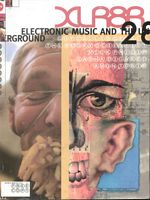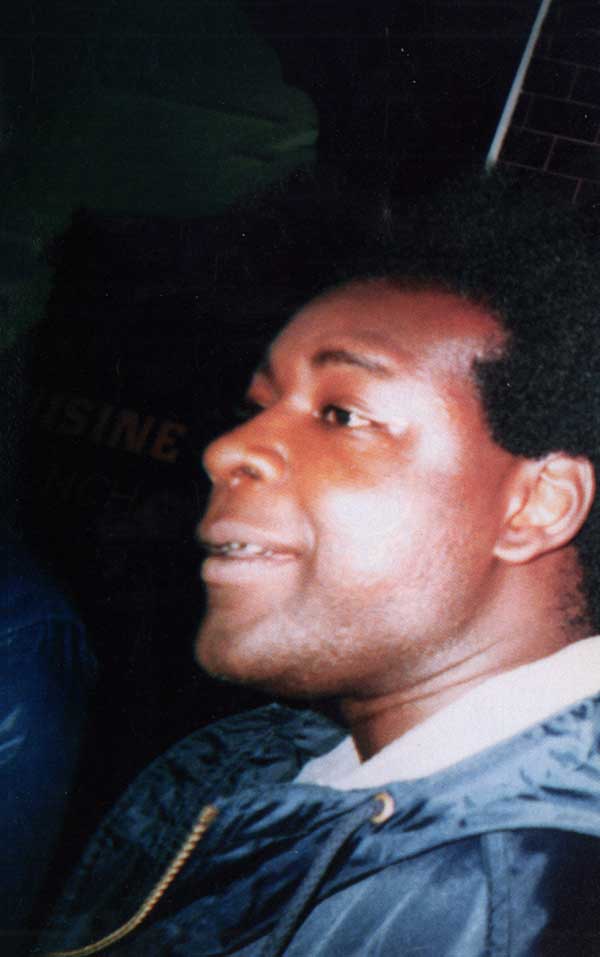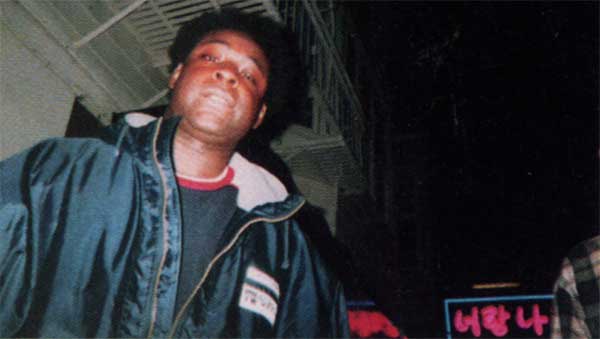| AQUARIUS RISING | |
 |
XL8R Issue 28 August 1997 Page: ?? |
 Who hasn't heard the name 'Voodoo Ray'? First released in 1987, it was a landmark in the history of dance music, the 'track that put UK house on the map.' People who were there back in the day tend to go off about how moving it was - when played on anything louder than a home stereo, it had the power to banish one's ego to the netherworlds and transport a dancefloor to that realm where time has no meaning. The amusing thing is that Gerald had no idea he was creating a monster - he was actually still new to the whole production thing. "It was the first thing I kind of went into a professional studio to do...l didn't really take it that seriously at the time - I just had some bits and pieces of equipment and was just throwing stuff together." He couldn't even call it what he wanted -'Voodoo Rage'- because there wasn't enough room in the sampler for all the letters. It was also the first time Gerald used samples in a track - in it one can hear the beginnings of his unique, moody style forming, perched on the verge of evolution. It was the start of a brilliant career that would span a decade and traverse many styles of music. Shortly after 'Ray' he began working with 808 State, becoming part of the group and adding his soul perspective to their sound. Until that is, their egos expanded to the point where they decided they didn't need him any more. This was fine with Gerald, as he had been planning on leaving the group anyway, but it wasn't fine when they released some music that Gerald had writ-ten for them and claimed that it was all by them. This led to a bit of a legal battle and a lot of hard feelings, and ironically enough, inspired Gerald's earliest experiments with breakbeats in his answer to 808 State's 'Pacific State.' "I did 'Specific Hate' kind of as a backlash because one of the things that..[808 State]...used to say is 'oh, we're not going to use breakbeats, and we're going to keep sampling down to a minimum.' So I thought, what I'm going to do, because you put that track out and I didn't want you to, is do a track using the same way of programming and doing exactly the same kind of thing, but basically just adding different elements to it that they wouldn't like." Hence his first use of the breakbeats that would eventually become the trademark for him-self and a whole new generation of producers. His next step taken, Gerald continued on his path, just doing his own thing, as always. He had grown a bit disaffected with the house scene, as he saw its focus shift from the music and the vibe to money and fashion, and a brief signing to corporate behemoth Sony Music only solidified this attitude. "I seriously thought 'well, it's a big company, they can expand on what I'm doing.' I saw it as a way of growing up, growing out-wards. I thought that it would be cool, that they could invest in me and that I could work something out from there. But they were more disorganized than I was - they didn't have a clue about what I was doing, they didn't have any way of knowing how to develop it - they thought 'well, if we can spend enough money on you, we can make you sound like that person because that person's successful....' The music comes first, and that should be the core of what it's all about. I mean, I hear some things now, and it's like they didn't really go into it thinking about what they were making, they just heard a mix that someone had done that was successful, and they used that to create something that would sell. It's like trying to find the right formula to make a hit, instead of trying to find a way of pulling people into a sound, or even just thinking, 'well, what would I like to hear?'" So, ever the loner, Gerald left Sony and formed his own label, Juice Box, to handle all subsequent releases. And boy, did he do the right thing!  In 1995 Gerald unleashed 'Black Secret Technology' upon an unsuspecting public and the face of modern music was changed forever. One of the first full-length drum and bass albums ever made, it sounded so different and so intelligent that nobody knew quite what to think - it was an entirely new animal, water to jungle's fire, a masterpiece of soul and percussion. The techniques he used and the soundscapes he created were so ahead of their time, so advanced and futuristic, that the rest of drum and bass is yet to catch up and one wonders if they ever will. Gerald's concept for the album was really to go against the grain - instead of producing a series of dancefloor tracks, he did what nobody had done before: a drum and bass concept album made for listening and contemplating in the home. What made the album so unique and memorable was its sheer depth. Rather than simply combining obvious breakbeats with some basslines and calling it a day, Gerald focused intently on each individual sound, pushing their frequencies to the max, thus re-defining beat structures as we know them. Every sound on the album is thoroughly processed, tweaked out, reversed, re-aligned, and generally warped beyond the point of recognition, then fine-tuned and amplified. Drums are filtered and time-stretched and other percussive sounds are intertwined around and within them, making it impossible to tell where one pattern ends and the next one begins, blurring the line between rhythm and melody. The pieces are then meticulously layered on top of one another, woven together with exacting precision to form an infinitely complex, organic whole. The result is magnificent - soulful, so soulful, and moving beyond belief. In a scene comprised mainly of peak-hour party tracks, putting out an album like "Black Secret Technology" meant taking a serious risk. A risk, however, that actually paid off. "We didn't really expect that much of it, because it was such an underground type thing, but all of a sudden, it totally blew up all over Europe." Indeed, Gerald has become quite in-demand east of the Atlantic, DJing in a number of countries and playing live shows in front of blown-away audiences. Unfortunately, in the States "...Technology" was pretty much slept on, while artists like Goldie and LTJ Bukem garnered mass amounts of attention and media coverage, Gerald's work was left to the underground and was largely ignored by the press. Only recently, after two years of mental evolution as a species and a recent digitally remastered re-release of the album, has his brilliance been duly acknowledged by the larger part of the dance music press. The timing couldn't be better: "Aquarius Rising," Gerald's new album, is due out in stores by this Summer. So, what does he have in store for us this time? "The new album is going to be a little more straight forward, with a bit of a harder edge, geared more towards the dancefloor....Basically, there's going to be three different types of track on it - some completely instrumental tracks, with no vocals or anything, then there will be a few with sampled vocals, like on ("Black Secret Technology"), and then there are the ones that are like whole songs, with live vocalists and more of a song type structure. I'm working with this one vocalist named Tamsin, and I've got a track that I did with Lady Miss Kier from Dee-Lite on there as well." Good. Although at the time of writing this, I've only heard a few of the new cuts, I can tell from those alone that hedz are once again going to be levelled by Gerald's sinister beat methodology. Imagine, the master of emotive elicitation configuring sound formats specifically for the purpose of causing one to lose one's mind on a dancefloor - it looks like yet another monster is about to be unleashed. Gerald's ideals are as timeless as his art - his positive attitude, his firm belief in just being himself, and his willingness to take chances with his music are the factors that have enabled him to survive for so long in a scene so full of sharks and shysters, biters and busters. Those same elements are the ones that will propel him through electronic history and into the next millennium. Count on him constantly challenging your perception and consistently being present whenever music takes its next evolutionary step. [Author: XL8R] |
|